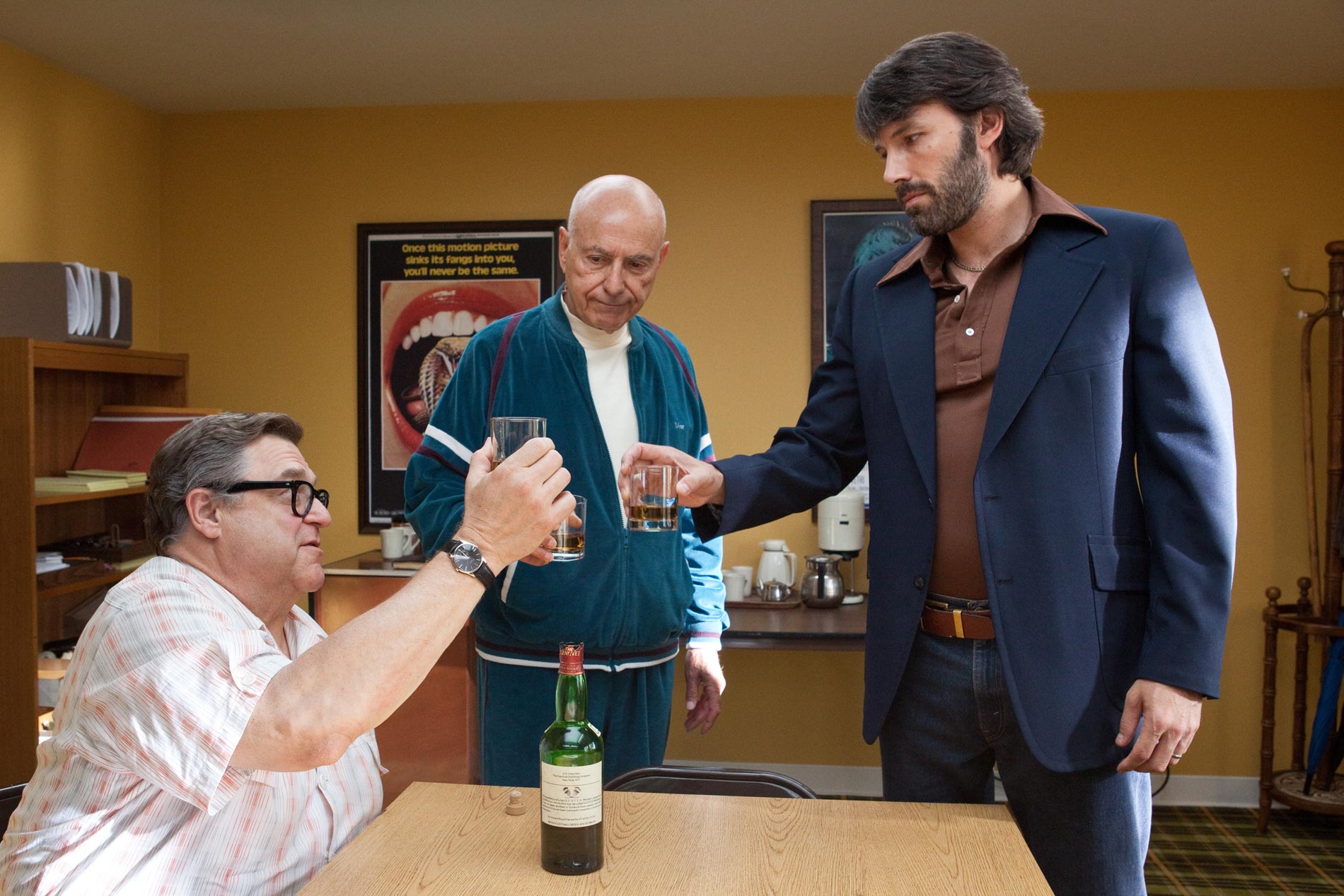Directed by Ben Affleck
Written by Chris Terrio
USA, 2012
Improbably, Ben Affleck has turned his career around in the last few years from the pit where such cinematic embarrassments as Gigli and Daredevil forever reside. He’s essentially transformed himself from a tabloid cover-star into a poised actor-director who subscribes to the “Hollywood doesn’t make movies like in the old days” mentality. Following his first two directorial efforts, Gone Baby Gone and The Town, Affleck is again behind the camera and starring as the lead in the taut new political thriller Argo, whose exceptional second half is almost good enough to make its slightly awkward, cluttered first hour forgivable.
Argo, based on a true story, begins in November of 1979 as the Iranian Revolution begins and militants take members of the U.S. embassy in Tehran hostage to force the American government to send Iran’s deposed Shah back home to face justice. Unbeknownst to the revolutionaries, six other American embassy employees have holed up in the Canadian ambassador’s estate, evading capture for over 2 months. Eventually, the State Department and CIA coordinate to rescue this group, known as the Houseguests. Affleck plays CIA exfiltration expert Tony Mendez—looking awfully like Ellis from Die Hard, and only somewhat like the real Mendez, odd considering how the actors playing the Houseguests look strikingly similar to their real-life counterparts—who has to devise a believable cover for these Americans. He hits upon the idea of creating a fake Canadian film production, for a cheesy Star Wars knockoff called Argo, scouting locations in Iran and giving the Houseguests identities within the production. Mendez enlists a makeup artist (John Goodman) and big-shot producer (Alan Arkin) to help give the false movie enough weight so it’ll hold up when he attempts to get the Americans out of the country.
Though Argo embraces the inherent silliness of this harebrained scheme, especially in the early Hollywood sequences, it’s fraught with sometimes unbearable tension. We may know of the Iranian hostage crisis, but this mission, due to how dangerous it would be for the Iranians to learn of America’s involvement, wasn’t declassified until 1997. Affleck and screenwriter Chris Terrio are likely gambling on most of the populace being unaware of the story’s details, or even if the Houseguests got out alive. Thus, once Tony touches down in Tehran to lay out his plan to bring his fellow citizens back to safety, Argo becomes a terrific, single-minded, and suspenseful drama, with sequence after sequence where Tony and the Houseguests run into one obstacle after another. The way the second hour unfolds is quite marvelous, and a testament to Affleck’s skill as a surehanded director. Unlike The Town, there’s not much in the way of big, explosive action, but Argo feels more confident, less tied down to some sense of Bostonian heritage as with his previous work.
Where Argo trips up, though not terribly often, is in its first hour, in the somewhat grinding setup to get Tony into Iran, in the same room as the people he’s tasked with saving. Affleck and Terrio clearly see a burden in explaining all of the necessary details to the audience; the film opens, cleverly, with a quick history of what led up to the Iranian Revolution via animated storyboards and stock news footage. However, a lot of that first half is rife with exposition; while we need to know exactly how and why this situation happened, Affleck doesn’t have as firm a grip on the opening. In some ways, the second hour of Argo being so damn good is what throws the first hour into sharp relief.
Wisely, Affleck doesn’t stack Argo with a huge cast full of big names, instead working with familiar faces. In fact, he’s probably the most well-known performer, doing a decent job as Mendez, whose quiet but steadfast dedication to his job is the Houseguests’ best hope for survival. Bryan Cranston, Goodman, Arkin, and character actors like Kyle Chandler, Titus Welliver, and Chris Messina are all solid in supporting roles. None of the actors playing the Houseguests get to be particularly remarkable, though Mendez’s conflicts with one, played by Scoot McNairy, stand out. McNairy is fine as Joe Stafford, but throughout Argo, Joe seems to exist solely to provide a counterbalance, challenging Tony’s authority. When Joe criticizes the admittedly ridiculous plot to help him and the others escape Iran, another of the hostages asks, “What world are you living in?” referring to the fact that they don’t have many options to choose from. The movie’s frustratingly unwilling to expand Joe as a character, so we could maybe better understand why he’s so stubborn as to not realize or accept that he has no other choices.
Despite some narrative hiccups, Argo is an assured throwback to political thrillers like Three Days of the Condor, 1970s-era stories infused with paranoia, suspicion, and unspeakable stress. At its best, the movie offers an extremely tense experience, up there with recent films like The Hurt Locker. The movie’s always at least decent—though there is a repeated line used for laughs that becomes predictable and worn out by the end—but it doesn’t fully lift off, free of expository burdens, until its crackling second hour. Still, Argo is Ben Affleck’s best film as director, and further proof that he may be our generation’s Robert Redford, able to bring a otherwise-absent level of intelligence to mainstream adult filmmaking.
— Josh Spiegel




